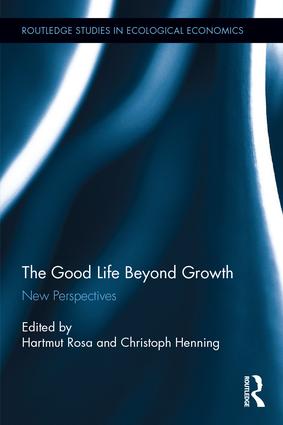
Edited by Hartmut Rosa & Christoph Henning. From Routledge:
Many countries have experienced a decline of economic growth for decades, an effect that was only aggravated by the recent global financial crisis. What if in the 21st century this is no longer an exception, but the general rule? Does an economy without growth necessarily bring hardship and crises, as is often assumed? Or could it be a chance for a better life? Authors have long argued that money added to an income that already secures basic needs no longer enhances well-being. Also, ecological constraints and a sinking global absorption capacity increasingly reduce the margin of profitability on investments. Efforts to restore growth politically, however, often lead to reduced levels of social protection, reduced ecological and health standards, unfair tax burdens and rising inequalities. Thus it is time to dissolve the link between economic growth and the good life.
This book argues that a good life beyond growth is not only possible, but highly desirable. It conceptualizes “the good life” as a fulfilled life that is embedded in social relations and at peace with nature, independent of a mounting availability of resources. In bringing together experts from different fields, this book opens an interdisciplinary discussion that has often been restricted to separate disciplines. Philosophers, sociologists, economists and activists come together to discuss the political and social conditions of a good life in societies which no longer rely on economic growth and no longer call for an ever expanding circle of extraction, consumption, pollution, waste, conflict, and psychological burnout.
Read together, these essays will have a major impact on the debates about economic growth, economic and ecological justice, and the good life in times of crisis.
See more here
For those interested in performing a review of this book for URPE’s flagship journal, Review of Radical Political Economics, please get in touch with David Barkin
